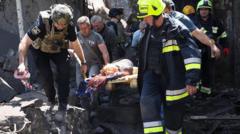The recent ceasefire between Iran and Israel has left many Iranians feeling exhausted and apprehensive. Individuals from Tehran express their concerns over the war's impact on civilians, government priorities, and the future of their country, reflecting both skepticism about the ceasefire's longevity and a longing for true peace.
Resilience Amidst Ceasefire: Iranians Voice Exhaustion Following Conflict

Resilience Amidst Ceasefire: Iranians Voice Exhaustion Following Conflict
As a delicate ceasefire is announced between Iran and Israel, ordinary Iranians share their fears, despair, and hopes for peace after 12 days of devastating conflict.
Ordinary Iranians are grappling with a mix of exhaustion and unease following the recently announced ceasefire between Iran and Israel after 12 days of intense conflict. In conversations with BBC Persian, many citizens—who spoke under anonymity for their safety—expressed feelings of suffering as government leaders turn to military priorities over infrastructural needs.
Sirous, an Iranian from Tehran, shared a disheartening perspective, suggesting that the hostilities stemmed from external forces, stating, "The whole war was orchestrated... It is the Iranian people who are left to suffer." Amidst the chaos, reports indicate at least 606 fatalities, although independent sources suspect the actual death toll is far higher, intensifying fears within the populace regarding their safety and government actions.
Minoo, another Iranian who chose to remain anonymous, articulated a fervent desire for peace. "We are exhausted. We don't want war, we don't want sanctions, and we...just want to live in peace in the country we love." Her concerns resonate with many who are wary of the regime's response to its diminished status, fearing that, in its desperation, the Islamic Republic may intensify its repressive measures against dissent.
Despite a ceasefire being declared by Donald Trump, hostilities continued, with reports of explosions in northern Iran and accusations of violations from both sides. Many Iranians, including Sara, expressed skepticism about the ceasefire's viability, fearing it was merely a temporary façade.
"In this climate of tension, this ceasefire will definitely collapse," predicted Arman, also using a pseudonym. Meanwhile, Kian speculated that the ceasefire might be a tactic to draw Iranian leadership out, stating, "This war won't end with a ceasefire... The regime does not stand a chance."
As this fragile peace is observed, the Iranian public remains deeply concerned about the true cost of the conflict and the realities of life under a strained regime. All eyes now remain on the skies, anxiously awaiting whether calm will prevail or if the turmoil will reignite.























